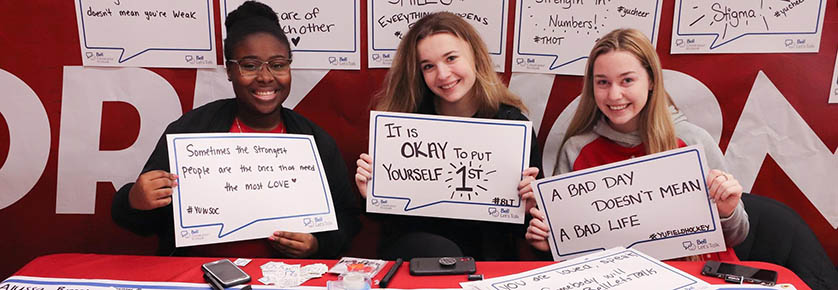Members of the York University community are invited to join Athletics & Recreation for a week of virtual events during the Bell Let’s Talk campaign. The University will host events Jan. 25 to 28 that are free and open to students, staff and faculty. Help end the stigma surrounding mental illness by sharing thoughts, experiences and support through virtual events and on social media.
Bell Let’s Talk Day will officially take place on Thursday, Jan. 28, but Athletics & Recreation have scheduled a number of events through the week to raise awareness for this important issue.
 Monday, Jan. 25
Monday, Jan. 25
Valuing your Mental Health Seminar, 5 to 6 p.m.
Learn from guest speakers and special panelists from York’s clinical Psychology Department on how to improve mental health during the pandemic. Topics include, but are not limited to, work-life balance, stress and anxiety management. Spaces are limited. Register today at reconline.yorkulions.ca.
Tuesday, Jan. 26
Instagram Talk to us!, 11 a.m.
Join this ‘talk to us; hour @yorkulions Instagram.’ We will be asking students “How do you prioritize self care during the school year?” and will be sharing responses throughout the afternoon. Participate for a chance to win a Bell Let’s Talk toque.
Colouring Hangout, 1 to 2 p.m.
Join us for an hour of colouring while learning how to journal, a great way to manage stress and mental health. Learn how to get started and why journalling can be helpful. Colouring is used to explore feelings, foster self-awareness, manage behaviour and addictions, develop social skills, improve reality orientation, reduce anxiety and increase self-esteem. Yet, art therapy is not only about learning and improving yourself – it’s a means of personal expression, too. Download a virtual colouring sheet and bring some art supplies and/or a pencil.
Zoom Link: https://yorku.zoom.us/j/95865444232?pwd=WnRZRnZtYjl6bWdjYndJVWQ0RUdEZz09&from=addon.
Wednesday, Jan. 27
Healthy Meals with a Nutritionist, 11 to 11:45 a.m.
Join Sport Dietitian Katie Jessop in this session to learn about low-budget, high-quality protein meals and when it really matters for your sport (and doesn’t matter as much). Any and all questions about nutrition are encouraged.
Join us as we make overnight oats. You will need:
- 1 cup oats
- Greek yogurt or soft tofu
- Milk or milk alternative
Jessop is a registered dietitian specializing in sport nutrition. She works with athletes from varsity to elite level in endurance, team and weight class sports.
Join this event on Zoom:
Meeting ID: 959 9534 1909
Passcode: 522445
Wellness Wednesday
Check back online at https://yorkulions.ca/sports/2018/1/10/bell-lets-talk.aspx on Jan. 27 for Wellness Wednesday.
Hatha Yoga & Meditation Class in collaboration with Jack.org YorkU Chapter and Peace by PEACE, 6 to 7 p.m.
Join the YorkU chapter of Jack.org and Athletics & Recreation in an all-levels Vinyasa session to help support your self-care routine to prioritize student mental health. This medium intensity session will involve a flowing style class to deepen your understanding of postures, breathing, and relaxation to strengthen the body and to reduce stress. Link movement with breathing to help guide your body into a moving meditation to allow for deeper presence and confidence on and off the mat. Learn more about Peace by PEACE.
Register today at reconline.yorkulions.ca.
Thursday, Jan. 28: Bell Let’s Talk Day!

Share your Bubble!
Share your virtual Bell Let’s Talk bubble and tag @yorkulions. Participate for a chance to win a Bell Let’s Talk toque.
Complete your Bell Let’s Talk bubble at Virtual Photobooth; view the Athletics & Recreation Bell Let’s Talk gallery online at Virtual Gallery.
I AM A LION Ambassador Program – All ambassador students that share their bubble and hashtag #LionsAmbassador will receive an ambassador virtual stamp and be entered to win a Bell Let’s Talk toque. Not a member? Register for the Ambassador Program here.
Resources for Bell Let’s Talk events can be found here:
















 ‘Brainstorm,’ a special edition of YFile publishing on the first Friday of every month, showcases research and innovation at York University. It offers compelling and accessible feature-length stories about the world-leading and policy-relevant work of York’s academics and researchers across all disciplines and Faculties and encompasses both pure and applied research.
‘Brainstorm,’ a special edition of YFile publishing on the first Friday of every month, showcases research and innovation at York University. It offers compelling and accessible feature-length stories about the world-leading and policy-relevant work of York’s academics and researchers across all disciplines and Faculties and encompasses both pure and applied research.